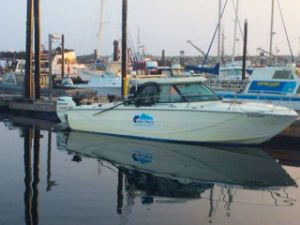The recent announcement by Fisheries Minister Keith Ashfield that the 400 or so commercial halibut quota holders will still enjoy 85 per cent of Canada’s total allowable catch while hundreds of thousands of recreational fishermen will struggle trying to maintain a viable fishery with only 15 per cent, falls far short of Prime Minister Harper’s promise to “finding a solution to British Columbia’s Halibut Allocation issue before the 2012 season which strikes a fair balance between all sectors.”
Let’s be clear upfront – what we’re talking about is the internal split of the International Pacific Halibut Commission derived Total Allowable Catch for Canada, which ensures that conservation needs are met. No one is talking about exceeding that catch limit. Conservation of the stock is not the issue here, it’s who gets what share of that catch limit (and why) that is at issue.
The potential for having a halibut season with bag limits reflecting a 50-per-cent decrease in what anglers can catch compared to three years ago, ending in the middle of the fishing season, has created a cloud of uncertainty that will prove devastating to B.C.’s lodges and charters over the next few months.
Our businesses are now put in the impossible situation of trying to convince tourists to come to B.C. to spend money in our coastal communities with no certainty as to whether or not they’ll be able to catch a halibut.
This is already driving those tourist dollars north to Alaska which has full seasons and, in some areas, more generous bag limits.
Without these tourist dollars, more local businesses will fail, staff will be laid off and fragile economies may well be put over the brink. For Ashfield to claim that this so-called “solution” to halibut access will end up “most importantly encouraging jobs and economic growth in British Columbia,” is a frightening display of ignorance as to what actually drives the coastal economy in most of our B.C. small coastal communities. Up and down the coast it has been tourism and the sustain-able, value-added jobs it provides that are lifting coastal communities out of their economic doldrums –not commercial fishing, and definitely not the activities of non-fishing quota holders who appear to be the only ones actually benefiting from this ill-conceived plan.
Even more troubling is the assumption that by forcing recreational fishermen to lease quota from the 400 or so individuals who currently believe they “own it” is some kind of solution for this uncertainty.
This ill-conceived scheme to further line the pockets of the powerful business interests who stand to gain by it was soundly rejected by the recreational fishery in 2011, and not without suffering. What is at stake here is the fundamental nature of common property resource access vs. privatization.
Again, this is not a conservation issue.
That recreational anglers and the businesses that support them should be forced to pay an individual for access to a common property resource that he or she doesn’t even legally “own” is ludicrous. In many cases these individuals didn’t even pay for their quota in the first place, it was gifted to them at taxpayer’s expense. In that context it becomes offensive. Anglers will reject this notion again but will DFO listen?
DFO Ottawa is clearly operating in a vacuum of information as to what the social and economic contributions of the recreational fishery in B.C. are relative to the commercial fishery. Studies abound, but DFO ignores them. It’s long overdue for DFO to undertake its own analysis so these important decisions can be based on data and evidence rather than political pressure and lobbying.
We all know that with the current economic situation we all face, the future is still uncertain for many people who make their living on and near the sea. When will DFO get in to the 21st century, and recognize the fact that it is our businesses that drive these local economies? Let’s hope they figure it out soon or it may be too late.
Lanny Sawchuk is chief operations officer of Oak Bay Marine Group in Victoria.
© Copyright (c) The Vancouver Sun

